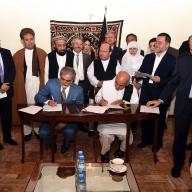On 30–31 October China hosted the postponed fourth ‘Heart of Asia’ ministerial conference in the framework of the Istanbul Process. Inaugurated in 2011, the Process is the only multilateral vehicle led by Afghanistan, thus permitting the country a greater say in its own affairs. Its objective is to facilitate Afghanistan’s reconstruction through interregional collaboration. To this end, and in a short period of time, the Process has successfully managed to commit 14 participating members, some of which previously had difficulty coming together, to cooperate. However, the Process is beset by a number of internal and external challenges that necessitate attention. Newly elected Afghan president Ashraf Ghani and his administration will have to designate ample human resources and diplomacy efforts to guarantee the process’ effectiveness and sustainability.
Related commentary: Private sector and peace
In Afghan fields
June 2012 marks what many have called a milestone in the ongoing war on narco-terrorism: the sentencing of Haji Bagcho, the biggest opium and heroin dealer in Central Asia.
